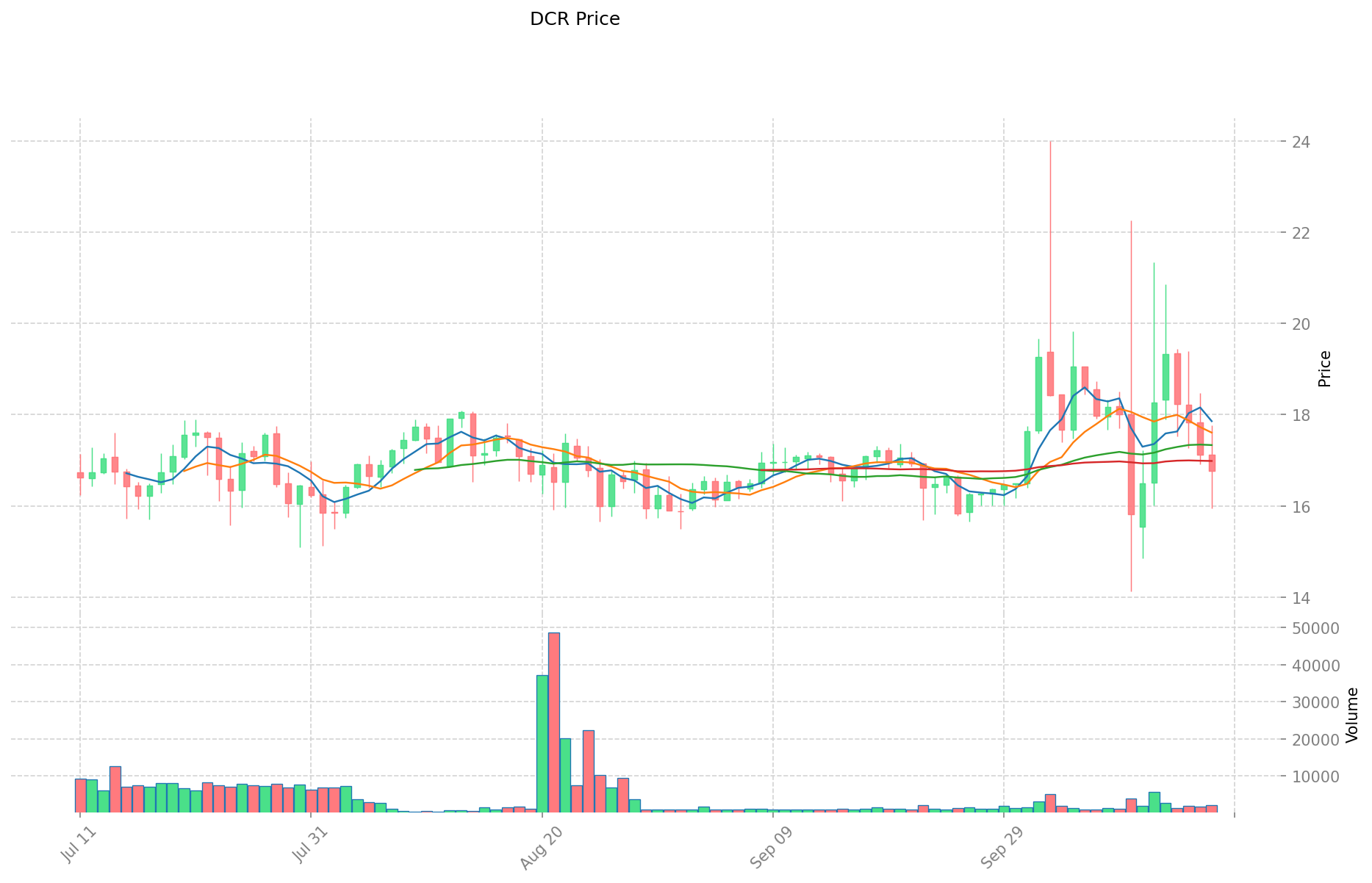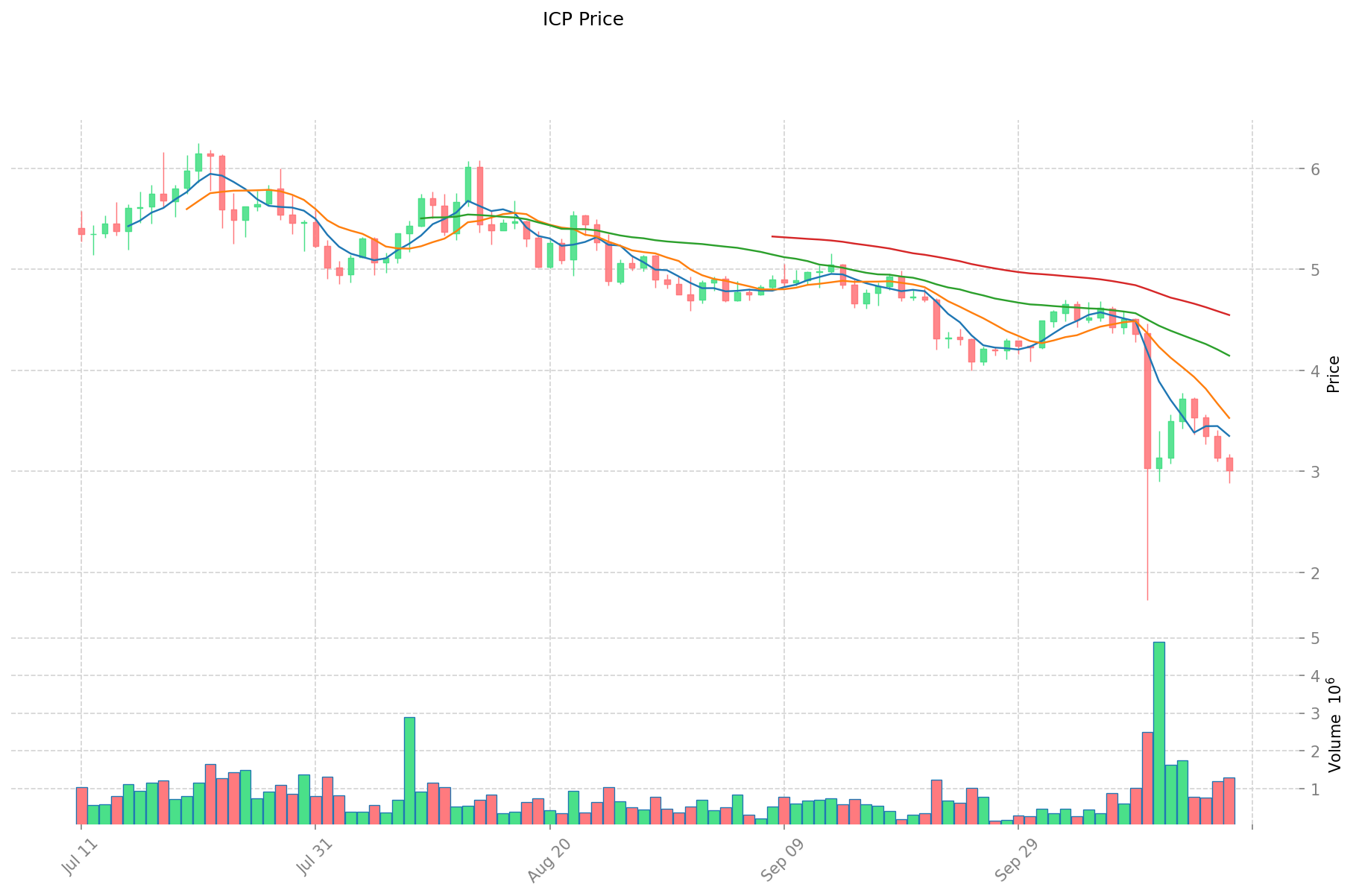DCR vs ICP: A Comparative Analysis of Decred and Internet Computer Protocols in Blockchain Innovation
Introduction: DCR vs ICP Investment Comparison
In the cryptocurrency market, the comparison between Decred (DCR) and Internet Computer (ICP) has always been an unavoidable topic for investors. The two not only have significant differences in market cap ranking, application scenarios, and price performance, but also represent different positioning in crypto assets.
Decred (DCR): Since its launch in 2016, it has gained market recognition for its emphasis on community governance and sustainable development.
Internet Computer (ICP): Introduced in 2021, it has been hailed as a decentralized public network for large-scale smart contract execution, aiming to become the "World Computer".
This article will comprehensively analyze the investment value comparison between DCR and ICP, focusing on historical price trends, supply mechanisms, institutional adoption, technological ecosystems, and future predictions, attempting to answer the question investors care about most:
"Which is the better buy right now?"
I. Price History Comparison and Current Market Status
DCR and ICP Historical Price Trends
- 2021: ICP launched with a peak price of $700.65, then experienced a significant decline.
- 2021: DCR reached its all-time high of $247.35, followed by a downward trend.
- Comparative analysis: During the market cycle, DCR dropped from its high of $247.35 to a low of $0.43154, while ICP fell from $700.65 to $2.23.
Current Market Situation (2025-10-18)
- DCR current price: $16.767
- ICP current price: $3.008
- 24-hour trading volume: DCR $35,359.95753 vs ICP $3,855,012.27124
- Market Sentiment Index (Fear & Greed Index): 22 (Extreme Fear)
Click to view real-time prices:
- Check DCR current price Market Price
- Check ICP current price Market Price


II. Core Factors Affecting Investment Value of DCR vs ICP
Supply Mechanisms Comparison (Tokenomics)
- DCR: Fixed maximum supply of 21 million coins with approximately 14.5 million currently in circulation. Employs a hybrid consensus mechanism combining Proof-of-Work and Proof-of-Stake.
- ICP: Total supply of approximately 469 million tokens, with a deflationary mechanism - tokens are burned when creating cycles for computation on the Internet Computer.
- 📌 Historical pattern: DCR's scarcity model follows Bitcoin's approach while ICP's deflationary mechanism is designed to create value as network usage increases.
Institutional Adoption and Market Applications
- Institutional holdings: ICP has garnered more institutional interest with backing from Andreessen Horowitz, Polychain Capital, and other major venture capital firms.
- Enterprise adoption: ICP focuses on enterprise applications for decentralized web services and cloud computing alternatives, while DCR emphasizes governance and store of value applications.
- Regulatory attitudes: Both projects face varying regulatory scrutiny, though DCR's governance-focused approach may face fewer regulatory hurdles than ICP's ambitious web services infrastructure.
Technical Development and Ecosystem Building
- DCR technical upgrades: Focus on privacy features, atomic swaps, and decentralized governance through Politeia proposal system.
- ICP technical development: Continuous development of the Internet Computer Protocol, canister smart contracts, and integration with Bitcoin and Ethereum networks.
- Ecosystem comparison: ICP has a broader focus on web services, dApps, and enterprise solutions, while DCR emphasizes governance, privacy, and financial applications.
Macroeconomic Factors and Market Cycles
- Performance during inflation: DCR's fixed supply model potentially offers better inflation resistance similar to Bitcoin.
- Macroeconomic monetary policy: Both tokens show sensitivity to interest rates and dollar strength, though DCR's Bitcoin-like properties may make it more correlated with traditional crypto market cycles.
- Geopolitical factors: DCR's focus on governance and financial sovereignty may appeal during periods of political uncertainty, while ICP's infrastructure focus may benefit from increased demand for decentralized internet services.
III. 2025-2030 Price Prediction: DCR vs ICP
Short-term Prediction (2025)
- DCR: Conservative $15.42 - $16.76 | Optimistic $16.76 - $20.62
- ICP: Conservative $2.46 - $3.00 | Optimistic $3.00 - $3.09
Mid-term Prediction (2027)
- DCR may enter a growth phase, with prices expected in the range of $18.46 - $25.80
- ICP may enter a stabilization phase, with prices expected in the range of $3.00 - $3.22
- Key drivers: Institutional capital inflow, ETF, ecosystem development
Long-term Prediction (2030)
- DCR: Base scenario $31.46 - $38.07 | Optimistic scenario $38.07+
- ICP: Base scenario $3.89 - $4.59 | Optimistic scenario $4.59+
Disclaimer
DCR:
| 年份 | 预测最高价 | 预测平均价格 | 预测最低价 | 涨跌幅 |
|---|---|---|---|---|
| 2025 | 20.61726 | 16.762 | 15.42104 | 0 |
| 2026 | 25.7916894 | 18.68963 | 17.1944596 | 11 |
| 2027 | 25.799165252 | 22.2406597 | 18.459747551 | 32 |
| 2028 | 27.14250109788 | 24.019912476 | 12.25015536276 | 43 |
| 2029 | 37.3485619089324 | 25.58120678694 | 17.3952206151192 | 52 |
| 2030 | 38.072510061002802 | 31.4648843479362 | 27.689098226183856 | 87 |
ICP:
| 年份 | 预测最高价 | 预测平均价格 | 预测最低价 | 涨跌幅 |
|---|---|---|---|---|
| 2025 | 3.09412 | 3.004 | 2.46328 | 0 |
| 2026 | 3.1405318 | 3.04906 | 1.7379642 | 1 |
| 2027 | 3.218587736 | 3.0947959 | 3.001952023 | 3 |
| 2028 | 3.88273093614 | 3.156691818 | 2.55692037258 | 5 |
| 2029 | 4.2588507662547 | 3.51971137707 | 2.3230095088662 | 17 |
| 2030 | 4.589351664561573 | 3.88928107166235 | 2.45024707514728 | 29 |
IV. Investment Strategy Comparison: DCR vs ICP
Long-term vs Short-term Investment Strategies
- DCR: Suitable for investors focused on governance, privacy, and store of value properties
- ICP: Suitable for investors interested in decentralized web services and enterprise blockchain solutions
Risk Management and Asset Allocation
- Conservative investors: DCR: 60% vs ICP: 40%
- Aggressive investors: DCR: 40% vs ICP: 60%
- Hedging tools: Stablecoin allocation, options, cross-currency portfolios
V. Potential Risk Comparison
Market Risks
- DCR: Volatility tied to overall cryptocurrency market sentiment
- ICP: Susceptibility to rapid price fluctuations due to its relatively new status
Technical Risks
- DCR: Scalability, network stability
- ICP: Centralization concerns, potential security vulnerabilities in the complex infrastructure
Regulatory Risks
- Global regulatory policies may have differing impacts on both, with ICP potentially facing more scrutiny due to its ambitious scope
VI. Conclusion: Which Is the Better Buy?
📌 Investment Value Summary:
- DCR advantages: Established governance model, fixed supply, and privacy features
- ICP advantages: Backing from major institutions, potential for widespread enterprise adoption
✅ Investment Advice:
- New investors: Consider a balanced approach, leaning towards DCR for its more established history
- Experienced investors: Explore opportunities in both, with a slight preference for ICP's growth potential
- Institutional investors: Evaluate ICP for its enterprise applications while maintaining exposure to DCR's governance-focused model
⚠️ Risk Warning: The cryptocurrency market is highly volatile. This article does not constitute investment advice. None
VII. FAQ
Q1: What are the main differences between DCR and ICP? A: DCR focuses on community governance and sustainable development, with a fixed supply of 21 million coins. ICP is designed as a decentralized public network for large-scale smart contract execution, with a deflationary mechanism and a total supply of about 469 million tokens.
Q2: Which cryptocurrency has performed better historically? A: Historically, DCR has shown more stability in price, dropping from its all-time high of $247.35 to a low of $0.43154. ICP, on the other hand, experienced a more dramatic decline, falling from $700.65 to $2.23 after its launch.
Q3: How do the supply mechanisms of DCR and ICP differ? A: DCR has a fixed maximum supply of 21 million coins, similar to Bitcoin's model. ICP has a total supply of about 469 million tokens with a deflationary mechanism where tokens are burned when creating cycles for computation on the Internet Computer.
Q4: Which cryptocurrency has more institutional adoption? A: ICP has garnered more institutional interest, with backing from major venture capital firms like Andreessen Horowitz and Polychain Capital. DCR, while having a strong community, has less prominent institutional backing.
Q5: What are the main technical focuses of each project? A: DCR focuses on privacy features, atomic swaps, and decentralized governance through its Politeia proposal system. ICP concentrates on developing the Internet Computer Protocol, canister smart contracts, and integration with Bitcoin and Ethereum networks.
Q6: How do DCR and ICP compare in terms of long-term price predictions? A: By 2030, DCR is predicted to reach a base scenario of $31.46 - $38.07, with an optimistic scenario of $38.07+. ICP's base scenario for 2030 is $3.89 - $4.59, with an optimistic scenario of $4.59+.
Q7: What investment strategies are recommended for DCR and ICP? A: For conservative investors, a 60% DCR to 40% ICP allocation is suggested. For aggressive investors, the recommendation is 40% DCR to 60% ICP. New investors might lean towards DCR for its more established history, while experienced investors could explore opportunities in both.
Q8: What are the main risks associated with investing in DCR and ICP? A: Both face market risks tied to overall cryptocurrency sentiment. DCR has technical risks related to scalability and network stability. ICP faces potential centralization concerns and security vulnerabilities due to its complex infrastructure. Regulatory risks may impact both, with ICP potentially facing more scrutiny due to its ambitious scope.
Share
Content